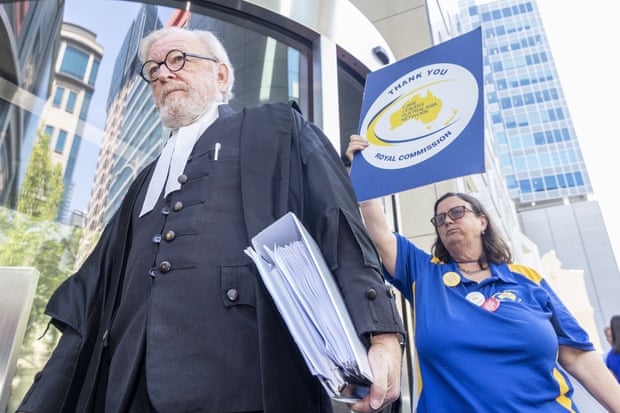George Pell Has Good Chance of Winning Appeal against Convictions, Expert Says
By Melissa Davey
Cardinal George Pell’s appeal against his convictions of sexually assaulting and penetrating choirboys is likely to be granted and has a good chance of succeeding on the basis of unreasonableness, according to legal experts and defence lawyers. Pell’s defence barrister, Robert Richter, told the sentencing hearing on Wednesday that his client’s appeal would be based on three key grounds: unreasonableness, the prohibition of video evidence in the closing address, and composition of the jury. Experts spoken to by Guardian Australia agreed that while the latter two appeared flimsy, an appeal on the basis of unreasonableness may have a high chance of success. This argument says the jury delivered a verdict that was not supported by the evidence. University of Melbourne law school’s criminal appeals and procedure expert, Professor Jeremy Gans, said this was a commonly used grounds for appeal. “Prosecutors would be completely prepared for an appeal based on this,” he said. “And it’s not a rare grounds to succeed on. This is the defence’s best shot and carries a bonus for them in that if they win there can almost certainly be no new trial. Because once a court decides a guilty verdict is unreasonable it means they don’t think guilty should be the verdict in the next trial either. They would almost certainly acquit. Basically on this grounds of appeal, the court gets to decide if the jury got it right.” Richter will also argue that the defence should have been allowed to play a video animation to jurors during the closing address. In the trial, Richter told chief judge Peter Kidd the animation showed the St Patrick’s cathedral floor plan and dots depicting the movements of Pell, the choir boys, altar servers and other witnesses during and after Sunday solemn mass. Kidd did not allow it to be shown on the grounds that jurors might view the video as evidence and fact, and new evidence is not allowed to be introduced during a closing address. Richter believed the video would demonstrate how impossible it would have been for Pell to be left alone after mass long enough to offend. “In most cases the judge wouldn’t care and would say, ‘Show your stupid video’,” Gans said. “But the law in Victoria isn’t clear on the use of visual aids during closing, and ultimately it’s a matter of discretion for the judge, who did allow Richter to use a PowerPoint demonstration but not the video animation. “Even if an appeal court thought the judge should have allowed the animation, it would be incredibly unlikely for the court to then order for a conviction to be squashed on the basis of this. Errors are made in trials all the time and appeals courts can’t order retrials on every mistake. They are looking for an actual miscarriage of justice.” The final grounds Richter will appeal on is the composition of the jury. Gans said this could mean several things. As an example, defence lawyers may have learned that a juror knew one of the victim’s family members, or that a juror had been sexually assaulted and therefore held a prejudiced view.
Usually, a single judge considers the appeal application. If there are grounds for appeal, the matter proceeds to a hearing. This usually takes a day. “No judge would decide not to allow an appeal in such a high-stakes trial,” Gans said. “Their grounds of appealing on unreasonableness is solid.” Three judges usually consider the matter at the hearing. If the conviction is set aside, the court may order a new trial, or acquit the accused. The process can take eight to 10 months, sometimes longer, but is likely to be expedited in Pell’s case due to the age of and health of witnesses. Only two out of the three judges need to agree whether the conviction should be set aside or not. Gans believes there is a good chance the appeal will succeed for several reasons, among them that there was only one key prosecution witness, and the second victim denied being assaulted before he died. However he added that jurors they were “totally allowed to convict on the basis that they found one person believable”. Richter was condemned after describing Pell’s oral rape of one victim as a “plain vanilla sexual penetration case” and on the “lower end” of offending. But a defence barrister in Melbourne, who declined to be named, said Richter was well-respected and well-liked in defence circles and would likely be granted leave to appeal on behalf of Pell. However, he said Richter was less experienced in historical sexual penetration cases. He was instead renowned for his rigorous uncovering of evidence and successfully representing high-profile gangland figures. “He is well-respected as one of the greats and you’d be hard pressed to find a defence barrister who would criticise him,” the lawyer said. “But some of his comments to the court about the offending were extraordinary and may have been tactics used on victims in the 80s when Richter was early in his career. He has built a career on calling it like it is. But the landscape has changed now. You can’t get away with saying those things in a court about sexual abuse these days and that’s why Kidd pulled him up on it.” The offences – one count of sexual penetrating a child under 16 and four counts of an indecent act with a child under 16 – each carry a maximum jail term of 10 years.
|
.
Any original material on these pages is copyright © BishopAccountability.org 2004. Reproduce freely with attribution.

